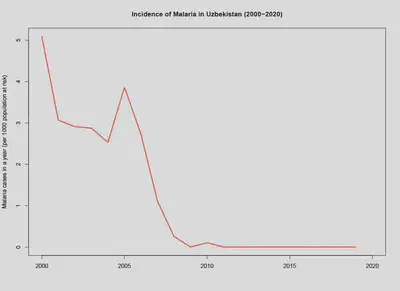2018

Overview
Uzbekistan was WHO certified malaria-free in 2018 with the last indigenous case being reported in 2010. Although Uzbekistan had achieved this feat earlier in the 1950s through DDT indoor residual spraying, larvicide, and the draining of swamps, returning soldiers from malaria-endemic countries in the 1980s had led to the reintroduction of the disease. To combat the resurgence and reduce malaria transmission, the Uzbekistan Ministry of Health established a national program for malaria surveillance and control in 2000. Indoor residual spraying with insecticides other than DDT was adopted, healthcare workers and health clinics were increased, and malaria surveillance strengthened. To stop border malaria, malaria was screened at checkpoints along Uzbekistan’s bordering countries of Tajikistan and Afghanistan. Malaria diagnosis and treatment were also given for free. Throughout the 2000s, Uzbekistan partnered with other ministries in addition to non-governmental organizations to accomplish these malaria elimination efforts.
Malaria Incidence in Uzbekistan (2000-2020)
| Year | Incidence of malaria (per 1,000 population at risk) |
|---|---|
| 2000 | 5.087004 |
| 2001 | 3.066752 |
| 2002 | 2.909834 |
| 2003 | 2.873898 |
| 2004 | 2.530966 |
| 2005 | 3.859689 |
| 2006 | 2.723474 |
| 2007 | 1.102779 |
| 2008 | 0.253385 |
| 2009 | 0 |
| 2010 | 0.105208 |
| 2011 | 0 |
| 2012 | 0 |
| 2013 | 0 |
| 2014 | 0 |
| 2015 | 0 |
| 2016 | 0 |
| 2017 | 0 |
| 2018 | 0 |
| 2019 | 0 |
| 2020 | Data unavailable |
References
Waititu E. (December 11, 2018). Making Uzbekistan Malaria Free is Major Achievement. News Releases.
Khusainova NG, Shamgunova GSh, Razakov ShA, Shoumarov SB. [Monitoring of the malaria situation and the assessment of antimalaria measures in the Republic of Uzbekistan]. Meditsinskaia Parazitologiia i Parazitarnye Bolezni. 2010 Jan-Mar(1):33-35. PMID: 20364473.
World Health Organization. (December 7, 2018). WHO certifies that Uzbekistan has eliminated malaria. News.